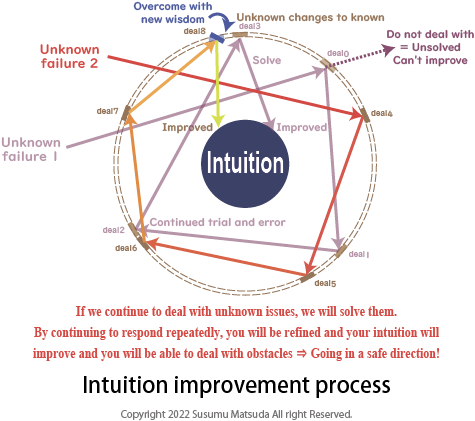
When a person encounters a disability, he or she first collates it with the information experienced or learned. Information that is determined to be known by collation will be resolved by deciding how to respond based on the correct coping information and acting. However, if the collated results do not match exactly, it will affect the judgment. After that, based on similar conditions in the past and knowledge that you have, you can infer the situation and simulate it instantly, and depending on the conditions, you will end up making a wrong decision. Making decisions with little knowledge of failure and little experience of failure entails great risks. Information stored in deeply memorized places (danger avoidance information memorized in the body inherited as a beast) is often memorized with characteristic sounds and odors, and memorized sounds of specific frequencies and specifics. In some cases, the information stored in the body is recalled by the smell of, and the coping action is executed by making an instant judgment according to it to avoid the obstacle. These are one of the abilities also called the escape reaction. Intuition is one way to overcome obstacles. It is a person who develops intuition and solves it by making judgments according to that intuition. Intuition raises the experience value of overcoming obstacles by repeating a large number of case studies, useful failure experiences, trial, and error processes to recover from the failure and from the many experiences, knowledge that is useless for judgment by removing the components, it becomes more sophisticated, and intuition is cultivated. By repeating these activities, we will improve our ability to overcome unknown obstacles. Of course, intuition alone cannot overcome unknown obstacles. However, rather than being able to do nothing, your intuition will increase your chances of survival by making the best decisions and taking immediate action.
No tags for this post.